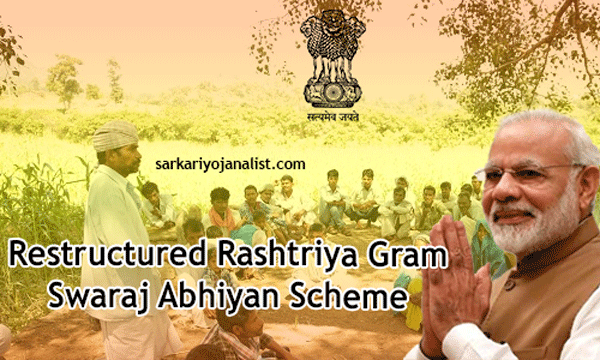The Cabinet Committee on Economic Affairs chaired by the Prime Minister Shri Narendra Modi gave its approval for restructured Centrally Sponsored Scheme of Rashtriya Gram Swaraj Abhiyan (RGSA) on 21 April, 2018.
The Scheme will be implemented during the period from 01.04.2018 to 31.03.2022 at the total cost of Rs. 7255.50 crore with the Central Share of Rs. 4500 crore and that of State Share of Rs. 2755.50 crore.
(i) This scheme will extend to all States and UTs of the Country and will also include institutions of rural local government in non-Part IX areas, where Panchayats do not exist,
(ii) The scheme will have both Central Component – National Level activities including “National Plan of Technical Assistance”, “Mission Mode project on e-Panchayat”, “Incentivization of Panchayats” and State component – Capacity Building of Panchayati Raj Institutions (PRIs),
(iii) The Central Component will be fully funded by the Government of India. However, Centre:State funding pattern for State Component will be 60:40 for all States, except North East and Hill States where Centre:State funding pattern will be 90:10. For all Union Territories (UTs) (with and without legislatures), the Central share will be 100%.
(iv) The implementation and monitoring of the activities of the scheme will broadly be aligned for achieving the Sustainable Development Goals (SDGs) with main thrust on Panchayats identified under Mission Antyodaya and 115 Aspirational districts as identified by NITI Aayog.
(v) The Scheme will converge capacity building initiatives of other Ministries with particular focus on those Ministries which will be impacted substantially by this Scheme,
(vi) Sunset date for RGSA will be 31.03.2030.
The approved scheme of RGSA will help more than 2.55 lakh Panchayati Raj Institutions (PRIs) to develop governance capabilities to deliver on SDGs through inclusive local governance with focus on optimum utilisation of available resources. The key principles of SDGs, i.e. leaving no one behind, reaching the farthest first and universal coverage, along with gender equality will be embedded in the design of all capacity building interventions including trainings, training modules and materials.


